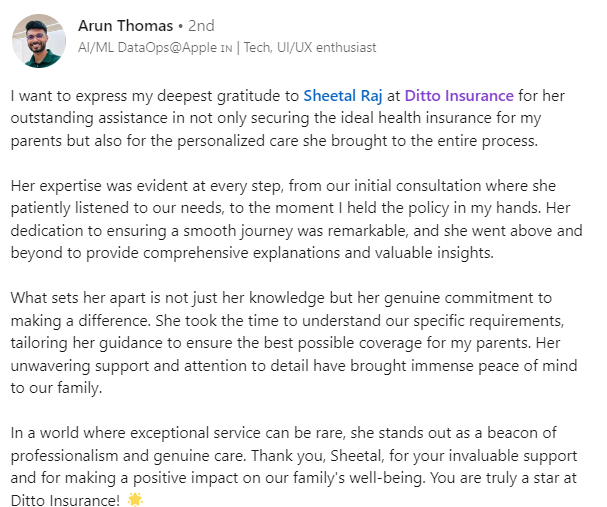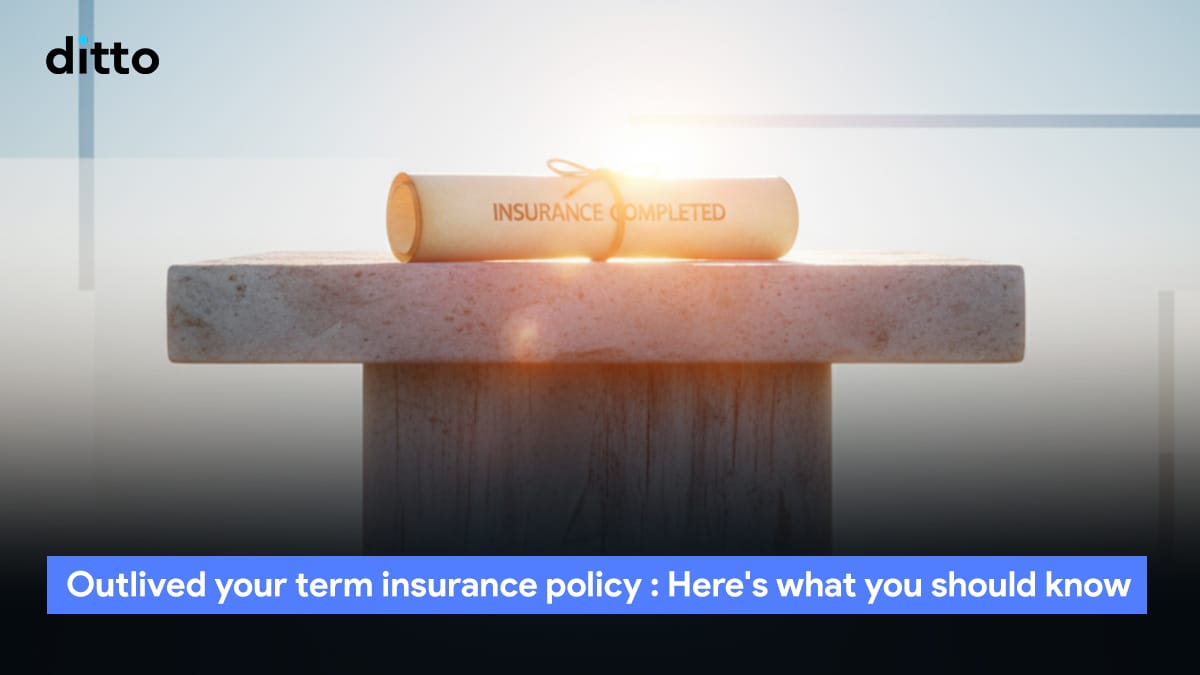| What Happens If You Outlive Your Life Insurance Policy? In India, what you get from surviving your policy depends on the product you purchase: 1)Pure term plans: Pays nothing at the end unless you specifically bought a return of premium" variant, which refunds total premiums paid minus riders charges; 2)Endowment/money-back plans: Pay the stated maturity/survival benefit (par plans add vested bonuses); 3)ULIPs: Pay the fund value, and you may take it in installments for up to 5 years; 4) Pension or annuity policies: At the end of the policy term ( vesting), you must use the money to buy an annuity that gives you regular income. You can also withdraw up to 60% of the amount as a lump sum and invest the rest. If you're under 60, you can choose to delay (defer) the vesting date. 5) Whole-life covers: Pay you until death or at least age 80, as per the rules. The option to extend insurance is not commonly available, which makes it crucial to choose the appropriate tenure when purchasing. |
Life insurance is meant to protect your family if something happens to you, but what if you outlive your policy term? It’s a question many policyholders have, especially with term insurance, where there’s usually no payout if you survive the term.
Outliving your policy isn’t necessarily a bad thing; it most likely means you’ve achieved financial stability and your family no longer depends on your income. Still, it’s essential to understand what happens next and what choices you have once your coverage ends.
This guide will walk you through maturity age, available options after expiry, renewal and conversion features, tax rules, and smart planning tips to keep your coverage aligned with your financial goals. Let's dive in.
Still unsure how to go about purchasing a life policy? Book a call with us, and let our experts guide you through the process.
What is the Maturity Age in Life Insurance?
Every life insurance policy is accompanied by two key milestones: the entry age (when you can purchase the policy) and the maturity age (when coverage ends).
- Entry Age: Most insurers allow you to purchase a policy between 18 and 60/65 years of age, depending on the plan. Child specific plans may allow purchase for children as young as 3 months old, with the parent as the proposer
- Maturity Age: Term plans usually offer max coverage up to 75–85 years, while whole life policies can extend up to 99 or 100 years.
For instance:
- A 30-year-old choosing a 40-year term plan stays covered till 70.
- A 50-year-old with a 20-year term plan is protected till 70.
| Note: For the sake of this discussion, we will focus on term plans, as they are a pure risk product that usually does not offer any maturity or extension options. |
What Options Do I Have If My Term Plan Is Expiring?
Here’s the simple truth: if your term policy expires while you’re still alive, there’s usually no payout. However, you do have a few options depending on your plan’s features and your situation:
1. Let It Expire
If you have planned everything well, are independent financially, have no dependents, and have a retirement corpus. There's no need to do anything; let it end. If you neither renew nor convert, your policy ends with no payout. This is common with pure term plans, which only pay out on death during the policy period.
2. Renew or Extend (If Allowed)
In India, renewable term life insurance is rare in retail term plans and is mostly seen in group or government schemes such as LIC’s One-Year Renewable Group Term Assurance and ICICI Prudential’s Group Term Plus.
Some term plans offer a renewable option after maturity, though this is rare. For instance, HDFC Life Click 2 Protect Supreme allows you to extend your Life coverage after its maturity.
Though the renewability feature allows you to extend your coverage multiple times after the original term has ended, it is subject to conditions such as regular medical checks and premium adjustments. This implies higher premiums, stricter medical underwriting, and a higher likelihood that the insurer will decline renewal.
3. Buy a New Term Plan
If renewability isn’t available, you can apply for a new term insurance plan.This means:
- Fresh underwriting: You’ll undergo new medical tests which would be stricter/more high level because of the advanced age.
- Higher premiums: Costs rise as you age.
Let’s take a quick look at the premiums for a 1cr term plan, if bought at different ages for coverage till age 70, without discounts:
| Age | Annual premium |
|---|---|
| 30 | ₹13,185 |
| 40 | ₹22,920 |
| 50 | ₹45,895 |
| 60 | ₹96,524 |
- Possible loadings or rejection: If your health has worsened, insurers may increase your premium (by 25-100%) or even decline coverage.
- Entry age restrictions : Most term plans in India can be purchased up to age 60 only, with some allowing up to 65, if you have already crossed this age, you can’t buy a new plan.
4. Convert to Another Policy
If your term plan is convertible, you can switch to another type, such as an endowment or ULIP, before it expires. This allows you to continue coverage and gain some investment value without undergoing additional medical checks.
The feature is quite rare in India, with only a limited number of insurers offering this. For instance, Kotak's Term Life Insurance plan offers a unique conversion option that allows you to switch to any eligible Kotak Life policy (excluding term plans) without undergoing medical tests, provided at least five years remain on your term.
| Point to be noted: At Ditto, we generally recommend choosing coverage until age 60 to 65. However, if your liabilities or dependents are likely to extend further, selecting a term up to age 70 to 75 can offer added peace of mind. Moreover, suppose you achieve your financial goals earlier than expected and become financially independent. In that case, you can always choose to discontinue the policy, making the premium cost less significant when coverage is no longer needed. |
Ditto’s Take on Outliving your Life Insurance Policy
At Ditto, we believe life insurance isn’t meant to last forever; it’s designed to protect your family during the years they rely on you the most.
If your term plan is nearing expiry, it’s often a positive sign, it means you’ve likely met key financial goals. Your children may now be independent, and your significant debts, like home or education loans, could be paid off. In such cases, not receiving a payout means that your plan has done its job.
However, if you still have dependents or ongoing financial responsibilities, consider buying a new policy or converting your existing one, depending on your health, policy t&c and budget.
You can also explore renewable or whole-life options, such as HDFC Life Click 2 Protect Supreme, Tata AIA Sampoorna Raksha Promise, or ICICI Pru iProtect Smart Plus, these can keep your coverage active well beyond 80–85 years, offering extended peace of mind.
Why Talk to Ditto for Your Life Coverage?
At Ditto, we’ve assisted over 7,00,000 customers with choosing the right insurance policy. Why customers like Arun below love us:

✅No-Spam & No Salesmen
✅Rated 4.9/5 on Google Reviews by 5,000+ happy customers
✅Backed by Zerodha
✅100% Free Consultation
You can book a FREE consultation. Slots are running out, so make sure you book a call now!
Final Thoughts
Here are the key takeaways to keep in mind if you outlive your life insurance policy:
- No payout after expiry: Term insurance ends when the policy term does, and no benefits are paid out.
- Maturity age matters: Most plans cover individuals up to 75–85 years, while whole life policies can extend coverage up to 99–100 years.
- Flexibility options: Renewable or convertible term policies allow you to extend or switch coverage without undergoing new medical checks.
- Higher costs later: Buying a new plan means higher premiums due to age and a new underwriting process.
- Plan smartly: Choose a policy term that aligns with your family’s financial goals, not just your lifespan.
FAQs
Do I get my money back if I outlive my term insurance?
It depends on the plan. Pure term plans don’t offer payouts, but endowment and ULIP plans may provide maturity benefits.
What happens to my premiums after expiry?
They aren’t refunded unless your plan has a return of premium (TROP) feature.
Can I get my premiums back?
Yes, only under a TROP policy will you receive all premiums paid (excluding GST & rider premiums) when it ends.
Can I renew my term plan automatically?
Once the coverage tenure ends, renewal is usually not allowed.
Should I choose a whole life policy instead?
Opt for whole life coverage if you want lifelong protection or estate planning benefits; otherwise, a standard term plan for the required duration suffices.
Last updated on:










